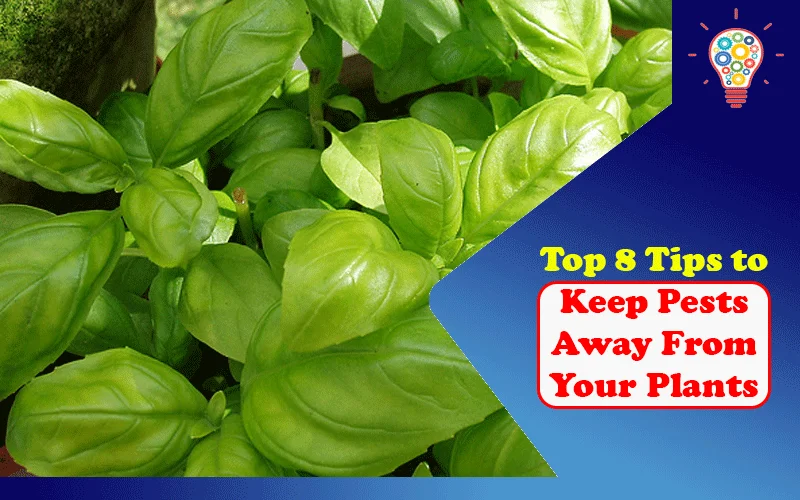Pest infestation is common, even in small gardens. But many people are not comfortable with the use of chemical pesticides. Luckily, there are many other non-chemical ways to fight garden pests, and these are equally effective as the traditional pesticides. Try these top 8 tips (that do not include pesticides) to keep pests away from your plants or backyard garden.
Table of Contents
1. Set traps
You should set traps near your plants to capture any lurking pests. These yellow-colored sticky cards can be bought from your nearest store. This is one of the most important plant care tips to keep your garden flourishing.
Use stakes for sticking these cards. These stakes must be inserted just an inch or two away from the plant. Any pests or insects that come near the plant will get glues to the card. This method also helps you analyze the extent of pest infestation. You can also stick these cards between the branches and stems.
The problem with this method is that it collects the good insects along with the bad ones. So if your garden has ladybugs or honey bees, you should try a different method for pest control.
2. Control weed growth
Weeds damage the plants in two ways these take up their water and nutrients and attract more pests. The more weeds there are in your garden, the more types of pests you will have to deal with. It is why you should control weed growth in order to keep pests away from your garden. A gardening fork is used for pulling out weeds from the soil.
Some undesirable plants also attract pests, such as dandelions, crabgrass, ivy, moss, and brambles. So, if you notice any such plants in your garden, take out your gardening fork and remove them at once.
3. Water in the morning
Watering the plants in the morning has so many benefits that many people are not aware of. This practice keeps your plants healthy, happy, and thriving. It also keeps the pests away. Let us explain how.
When you water your plants in the evening, the water does not have much time to evaporate. This water keeps the plants damp at night. And because moist foliage attracts more pests, your garden will soon suffer from a pest infestation.
But if you water your plants in the morning, all the water will evaporate before dusk, leaving the foliage dry and pest-free. Also, try to deeply water the plants once or twice a week rather than watering just their surface every day.
4. Clean your garden regularly
Pests and insects feed on decomposing matter. If there are old leaves and dead blooms on your garden bed, they will start to decompose after some days and will attract pests. These also increase the risk of getting diseases. You should clean your garden regularly to pick up these dead growths. You can make good use of these dead leaves by changing them into compost.
Just place a compost bin in the corner of your garden and throw all the dead leaves into it. These will turn to compost in 3-6 months. You can use it to add to your garden soil’s fertility.
5. Encourage beneficial insects
Some insects are beneficial for your plants as they kill or eat pests. You should welcome these insects to your garden to keep away harmful pests. But how can you attract beneficial insects to your garden?
These insects are attracted by the flowering plants that produce nectar. The insects feed on nectar as their food. You should plant more insectary plants in your garden for this purpose.
Ladybugs, wasps, beneficial nematodes, honey bees, dragonflies, and termites are examples of beneficial insects. So if you notice any of these insects flying or crawling around your garden, know that your plants are protected from pests.
6. Attract toads and frogs
Toads and frogs are just like beneficial insects but are quicker to kill pests. These two animals feed on smaller insects.
You can attract toads and frogs to your garden just by placing a bowl of water somewhere in there. You can also build a toad house.
7. Prune old branches
Whenever a leaf turns yellow, the plant tries its best to save it by channeling more nutrients and water towards it. It puts stress on the plant and weakens it. Pests feed more on stressing plants. It is why you should prune your plants more often to keep them healthy. Healthy plants are less susceptible to pest attacks.
Instead of limiting pruning to just once a year, prune more often. You should prune your plants whenever you notice any old branches or leaves.
You should also disinfect your gardening tools before pruning the plant. Otherwise, you will have to face a disease problem while trying to prevent a pest infestation.
8. Don’t squeeze all plants in a small space
Let your plants breathe! If you grow too many plants in a small space, they will soon get attacked by pests. It is because, in a congested space, there will be less air circulation. Less air circulation will lead to a warmer environment. More pests will habituate the foliage due to the heat and due to the fact that they will be well hidden from their predators.
You should spread out your garden and plant your seeds in some spaces. This way, all your plants will be well-ventilated and free from pest infestation.
Read Also: The Seed Is All You Need: New Gardener Tips


One thought on “Top 8 Tips to Keep Pests Away From Your Plants”